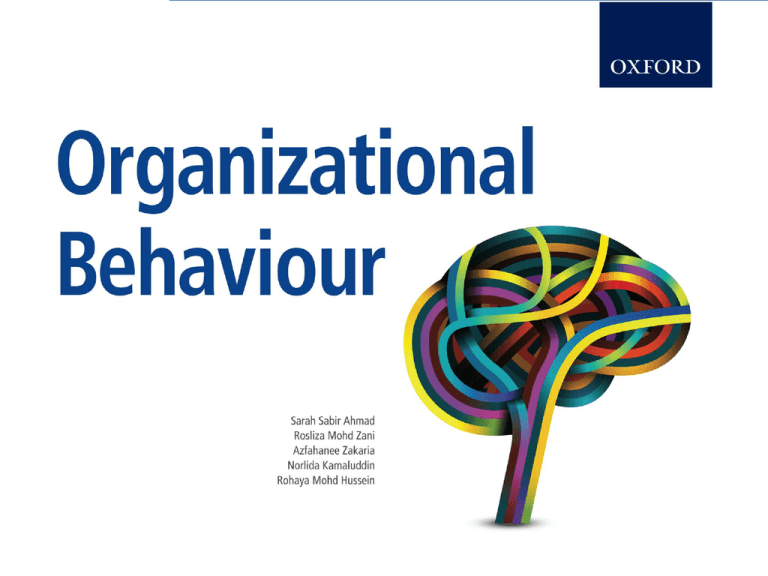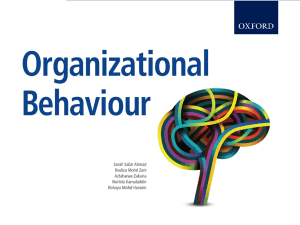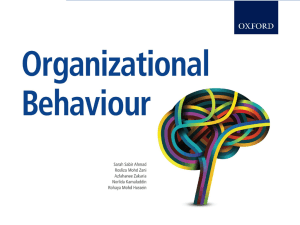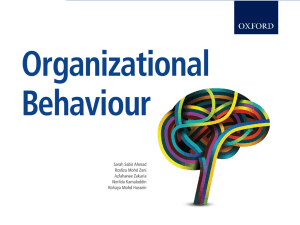
Organizational Behaviour
© Oxford Fajar Sdn. Bhd. (008974-T), 2013
All Rights Reserved
1– 1
Chapter 1
INTRODUCTION TO
ORGANIZATIONAL BEHAVIOUR
Organizational Behaviour
© Oxford Fajar Sdn. Bhd. (008974-T), 2013
All Rights Reserved
1– 2
LEARNING OUTCOMES
Define organizational behaviour
Explain the goals and forces of organizational behaviour
Understand the evolution and fundamental concepts of
organizational behaviour
Explain the distinction between the theories of
organizational behaviour
Understand the major approaches of organizational
behaviour
Discuss the response of organizational behaviour on
globalization, diversification and advancement in
technology
Organizational Behaviour
© Oxford Fajar Sdn. Bhd. (008974-T), 2013
All Rights Reserved
1– 3
INTRODUCTION
Understanding organizational behaviour allows
the managers to better manage employeemanager relations, improves job satisfaction,
and stimulates innovation and creativity thus
guiding him into creating a dynamic working
climate.
Organizational Behaviour
© Oxford Fajar Sdn. Bhd. (008974-T), 2013
All Rights Reserved
1– 4
DEFINITION
According to Gary Johns, "Organizations are
social inventions for accomplishing goals
through group efforts".
Organizational behaviour is concerned with
people's thoughts, feelings, emotions and
actions in setting up a work.
Organizational Behaviour
© Oxford Fajar Sdn. Bhd. (008974-T), 2013
All Rights Reserved
1– 5
GOALS OF ORGANIZATIONAL
BEHAVIOUR
Describe – Describe systematically how people behave
under a variety of conditions.
Understand – Understand why people behave as they
do.
Predict – The managers would have the capacity to
predict which employees might be dedicated and
productive or which ones might cause problems.
Control – Managers need to be able to improve results
through the actions they and their employees take, and
organizational behaviour can aid them in their pursuit of
this goal.
Organizational Behaviour
© Oxford Fajar Sdn. Bhd. (008974-T), 2013
All Rights Reserved
1– 6
THE IMPORTANCE OF
ORGANIZATIONAL BEHAVIOUR
Sharpening and Refining Our Decisions and
Actions
Personal Development through Organizational
Behaviour
Achieving Organizational and Individual
Effectiveness
Developing Interpersonal Skills
Organizational Behaviour
© Oxford Fajar Sdn. Bhd. (008974-T), 2013
All Rights Reserved
1– 7
FORCES OR ELEMENTS OF
ORGANIZATIONAL BEHAVIOUR
People: People make up the internal social system in
the organization. They consist of individuals and groups.
Structure: Structure defines the formal relationship and
use of people in the organization.
Technology: The technology imparts the physical and
economic conditions within which people work.
Social System: The social system provides external
environment within which the organization operates.
Organizational Behaviour
© Oxford Fajar Sdn. Bhd. (008974-T), 2013
All Rights Reserved
1– 8
EVOLUTION OF
ORGANIZATIONAL BEHAVIOUR
Scientific Management Approach
Bureaucratic Approach
Hawthorne Studies
Organizational Behaviour
© Oxford Fajar Sdn. Bhd. (008974-T), 2013
All Rights Reserved
1– 9
BASIC MODELS OF
ORGANIZATIONAL BEHAVIOUR
The System Model
The Custodial Model
The Supportive Model
The Collegial Model
The Autocratic Model
Organizational Behaviour
© Oxford Fajar Sdn. Bhd. (008974-T), 2013
All Rights Reserved
1– 10
FUNDAMENTAL CONCEPTS OF
ORGANIZATIONAL BEHAVIOUR
Nature of People
Nature of Organization
Organizational Behaviour
© Oxford Fajar Sdn. Bhd. (008974-T), 2013
All Rights Reserved
1– 11
NATURE OF PEOPLE
Individual Differences
A Whole Person
Motivated Behaviour
Human Dignity/Value of the Person
Organizational Behaviour
© Oxford Fajar Sdn. Bhd. (008974-T), 2013
All Rights Reserved
1– 12
NATURE OF ORGANIZATION
Social System
Mutual Interest
Organizational Behaviour
© Oxford Fajar Sdn. Bhd. (008974-T), 2013
All Rights Reserved
1– 13
APPROACHES TO
ORGANIZATIONAL BEHAVIOUR
Interdisciplinary Approach
A Contingency Approach
Productivity Approach
Systems Approach
Human Resources Approach
Organizational Behaviour
© Oxford Fajar Sdn. Bhd. (008974-T), 2013
All Rights Reserved
1– 14
RESPONSE OF ORGANIZATIONAL
BEHAVIOUR ON GLOBALIZATION
AND DIVERSIFICATION
Social Conditions
Political Conditions
Economic Conditions
Organizational Culture Differences
Workforce Diversification
Organizational Behaviour
© Oxford Fajar Sdn. Bhd. (008974-T), 2013
All Rights Reserved
1– 15






